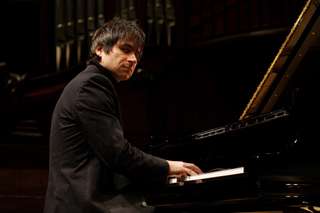|
Back
Naples Pizza! French Horn!! New York
Avery Fisher Hall, Lincoln Centre
07/31/2009 - & Aug. 1
Wolfgang Amadeus Mozart: Overture to “The Magic Flute”, K. 620 – Concerto No. 18 in B flat Major, K. 456 – Symphony No. 39 in E-flat Major, K. 543
Benjamin Britten: Serenade for Tenor, Horn and Strings, op. 31
Piotr Anderszewski (Piano), Toby Spence (Tenor), Lawrence DiBello (Horn)
Mostly Mozart Festival Orchestra, Edward Gardner (Conductor)

Piotr Anderszewski (© Idéale-Audience-GrzggorzPress)
After pizza in Naples, one can’t imagine eating pizza anywhere else. After hearing Benjamin Britten’s Serenade for Tenor, Horn and Strings at the Mostly Mozart Festival last night, I cannot imagine listening to it again on a mere recording.
It wasn’t that Toby Spence and Lawrence DiBello were necessarily preferable to its original honorees, Peter Pears and Dennis Brain. But Benjamin Britten composed words, music and space as equal partners. No recording can ever catch the echoes of horn and tenor, or the swirl of strings against the chattering horn, or the final offstage epilogue given by the horn. And in this performance, Toby Spence and Lawrence DiBello offered the drama, the sounds, and above all, the space to make Britten’s nocturnal dream come very much alive.
Mr. Spence has been the British tenor de jour for several years now, a terrific actor, with a voice equally at home for Bernstein’s Candide or the Simpleton in Boris Godunov. I had never heard Mr. DiBello before. His horn-playing, though, was not only error-free (almost impossible for the instrument in such a long work), but had the variety of sounds which Britten must have longed for.
The two soloists had a paradoxical situation here. At times, as in William Blake’s Elegy, horn and tenor vied for attention, each chattering away with almost jocular abandon. In the long anonymous Dirge, the two of them became almost hysterical describing the Day of Judgment. The poem is difficult enough in Chaucerian English, but Mr. Spence gave such dramatic momentum to the verses, that one understood immediately every nuance, every fierce interdiction.
Mr. Spence has a voice with pleasant low register, but is thoroughly open at the top. Too many British tenors tend to hold back in the upper ranges, but Mr. Spence let himself go, with a stentorian color that almost equaled a trumpet call.
Mr. DiBello understood the spatial requirements instinctively, stepping back when necessary, playing that epilogue offstage as if the tender remembrance of a dream. At one point, though, after Elegy, he played a horn glissando which not even Dennis Brain could effect. It was pure glissando: closer to a violin than a clarinet or blues harmonica. Those notes were stunning in a stunning performance, helped immaculately by the strings of the Mostly Mozart Festival Orchestra.
The orchestra had its share of good playing for the advertised star of the evening, Piotr Anderszewski. The Mozart B Flat Concerto is rarely put on the concert stage, but its great moments are honestly satisfying. It is a very big work for orchestra, and conductor Gardner made them rise to the occasion.
Mr. Anderszewski’s sensitive playing has been so bruited about that one anticipated pure poetry. That was not the case. Mr. Anderszewski played with pin-point accuracy, (albeit with some personal pausing for the opening theme), and he made that first movement sparkle. The finale, where Mozart suddenly changes keys, is always a surprise. With Mr. Anderszewski so happily involved in the jubilation of the music, that abrupt change to a minor mood was even more startling.
But the most memorable moments of all came in Mozart’s second movement variations. They can be wistful and dreamlike, as in Mr. Anderszewski’s first half of the movement. For the final variations, he delved truly deeply into the Mozart soul. The mood was unexpectedly profound. But the word “unexpected” comes with a caveat. Mr. Anderszewski always fascinates us, and his unforeseen depths are part of our expectations.
The concert began and ended with Mozart, so familiar that one can sit back and revel in its transparent genius. Mr. Gardner is a fine conductor, and his Magic Flute overture was the picture of what Elliott Carter called “The ever changing Mozart moods.” For the 39th Symphony, Mr. Gardner took some fast tempos for all four movements, but the Mostly Mozart Festival Orchestra danced along for the ride.
Harry Rolnick
|